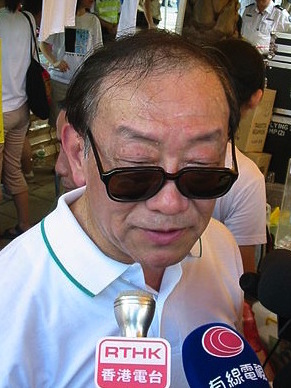
The Legislative Council of the Hong Kong Special Administrative Region (LegCo) is the unicameral legislature of Hong Kong. It sits under China's "one country, two systems" constitutional arrangement, and is the power centre of Hong Kong's hybrid representative democracy, though popular representation in the legislature has diminished significantly in recent years, along with its political diversity.

The Democratic Alliance for the Betterment and Progress of Hong Kong (DAB) is a pro-Beijing conservative political party in Hong Kong. Chaired by Gary Chan and holding 13 Legislative Council seats, it is currently the largest party in the legislature and in terms of membership, far ahead of other parties. It has been a key supporting force to the SAR administration and the central government's policies on Hong Kong.

The Democratic Party (DP) is a centre-left liberal political party in Hong Kong. Chaired by Lo Kin-hei, it is the flagship party in the pro-democracy camp and currently has seven elected representatives in the District Councils.

Martin Lee Chu-ming is a Hong Kong politician and barrister. He is the founding chairman of the United Democrats of Hong Kong and its successor, the Democratic Party, Hong Kong's flagship pro-democracy party. He was also a member of the Legislative Council of Hong Kong from 1985 to 1997 and from 1998 to 2008. Nicknamed the "Father of Democracy" in Hong Kong, he is recognised as one of the most prominent advocates for democracy and human rights in Hong Kong and China.

The Hong Kong Federation of Trade Unions (HKFTU) is a pro-Beijing labour and political group established in 1948 in Hong Kong. It is the oldest and largest labour group in Hong Kong with over 420,000 members in 253 affiliates and associated trade unions. Presided by Ng Chau-pei and chaired by Kingsley Wong, it currently holds four seats in the Legislative Council and five seats in the District Councils.

The Provisional Legislative Council (PLC) was the interim legislature of Hong Kong that operated from 1997 to 1998. The legislature was founded in Guangzhou and sat in Shenzhen from 1996 until the handover in 1997 and moved to Hong Kong to serve as the temporary replacement of the Legislative Council of Hong Kong. It was established by the Preparatory Committee for the Hong Kong Special Administrative Region by resolution at its Second Plenary Session on 24 March 1996. The 60 members of the PLC were elected on 21 December 1996 by the 400-member Selection Committee for the First Government of the HKSAR, which also elected the first Chief Executive. The official start date for this council was on 25 January 1997.

Allen Lee Peng-fei, CBE, JP was a Hong Kong industrialist, politician and political commentator. He was a member of the Legislative Council of Hong Kong, serving from 1978 to 1997 and was the Senior Member of the legislature from 1988 to 1991. He was also an unofficial member of the Executive Council of Hong Kong from 1986 to 1992. He was the founding chairman of the Liberal Party, a pro-business party in 1993 until he retired after he lost the 1998 election. After his retirement, he became a political commentator and hosted Legco Review, a RTHK weekly TV programme on the news about Legislative Council, among several other posts.

Legislative elections are held in Hong Kong every four years Legislative Council (LegCo) in accordance with Article 69 of the Basic Law. Legislative elections are held either at the expiry of a four-year term or when the Chief Executive dissolves the legislature and calls a new election.

Rita Fan Hsu Lai-tai is a senior Hong Kong politician. She was the first President of the Hong Kong SAR Legislative Council from 1998 to 2008 and a member of the Standing Committee of the National People's Congress (NPCSC).

The United Democrats of Hong Kong was the first political party in Hong Kong. Founded in 1990, the short-lived party was the united front of the liberal democracy forces in preparation of the 1991 first ever direct election for the Legislative Council of Hong Kong. The party won a landslide victory by sweeping 12 of the 18 directly elected seats in the election which shook the political landscape of Hong Kong. In 1994 it was merged with another pro-democracy party Meeting Point to form the contemporary Democratic Party.

The pro-democracy camp, also known as the pan-democracy camp, is a political alignment in Hong Kong that supports increased democracy, namely the universal suffrage of the Chief Executive and the Legislative Council as given by the Basic Law under the "One Country, Two Systems" framework.

The 1998 Hong Kong Legislative Council election was held on 24 May 1998 for members of the 1st Legislative Council of Hong Kong (LegCo) since the establishment of the Hong Kong Special Administrative Region (HKSAR) in 1997. Replacing the Provisional Legislative Council (PLC) strictly controlled by the Beijing government and boycotted by the pro-democracy camp, the elections returned 20 members from directly elected geographical constituencies, 10 seats from the Election Committee constituency and 30 members from functional constituencies, of which 10 were uncontested.

The Co-operative Resources Centre was a short-lived political group in the Legislative Council of Hong Kong (LegCo). Led by the Senior Unofficial Member of the Executive and Legislative Councils Allen Lee, it was established on 12 December 1991 by a group of 21 appointed and indirectly elected Legislative Council members from the functional constituencies. It became the largest conservative faction in the legislature countering the pro-democracy United Democrats of Hong Kong (UDHK) won a landslide victory in the first direct Legislative Council election in 1991. In 1993, it was transformed into the Liberal Party.

The 1996 Hong Kong Provisional Legislative Council election was held on 21 December 1996 for the members of the Provisional Legislative Council (PLC). The 60 members of the PLC was elected by the Selection Committee, a 400-member body elected by the Preparatory Committee for the Hong Kong Special Administrative Region, a Beijing-appointed body which was responsible for implementation work related to the establishment of the HKSAR.

The 1995 Hong Kong Legislative Council election for members of the Legislative Council of Hong Kong (LegCo) was held on 17 September 1995. It was the first, and only, fully elected legislative election in the colonial period before transferring Hong Kong's sovereignty to China two years later. The elections returned 20 members from directly elected geographical constituencies, 30 members from indirectly elected functional constituencies, and 10 members from elections committee constituency who were elected by all District Board members.

Meeting Point was a liberal political organisation and party in Hong Kong formed by a group of former student activists in the 1970s and intellectuals for the discussion for the Sino-British negotiation on the question of Hong Kong prospect in 1983. It was one of the earliest groups in Hong Kong that favoured Chinese sovereignty over Hong Kong but wanted a free, democratic and autonomous Hong Kong.

The Business and Professionals Alliance for Hong Kong (BPA) is a pro-business pro-Beijing political party in Hong Kong. Chaired by Lo Wai-kwok, the party is currently the second-largest party in the Legislative Council of Hong Kong, holding eight seats. It also has two representatives in the Executive Council and five seats in the District Councils.

The 1994 Hong Kong electoral reform was a set of significant constitutional changes in the last years of British colonial rule in Hong Kong before the handover of its sovereignty to the People's Republic of China (PRC) on 1 July 1997. The reform aimed at broadening the electorate base of the three-tiers elections in 1994 and 1995, namely the 1994 District Board elections, the 1995 Urban and Regional Council elections and the 1995 Legislative Council election. It was the flagship policy of the last colonial governor Chris Patten.
The election for the President of the Second Legislative Council took place on 4 October 2000 for members of the 2nd Legislative Council of Hong Kong to among themselves elect the President of the Legislative Council of Hong Kong for the duration of the council. Rita Fan from the pro-Beijing camp defeated former President Andrew Wong and was re-elected.
The election for the President of the First Legislative Council took place on 2 July 1998 for members of the 1st Legislative Council of Hong Kong to among themselves elect the President of the Legislative Council of Hong Kong for the duration of the council. Rita Fan from the pro-Beijing camp, who presided over the provisional legislature, defeated pre-handover President Andrew Wong.














